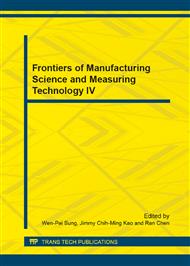p.1297
p.1301
p.1305
p.1309
p.1313
p.1317
p.1321
p.1328
p.1333
A Degree Distribution Optimization Algorithm in Unequal-Protected LT Code
Abstract:
LT code is the first practical implementation of digital fountain code. The coding behavior of LT code is mainly decided by the degree distribution which determines the relationship between source data and codeword. Since coding systems with unequal loss protection are widely applied, a degree distribution optimization algorithm is designed for unequal-protected LT code. The degree distribution that minimizes the number of un-recovered source symbols is found. By introducing the weighted cost, the optimal degree distribution can be solved by evolutionary strategy. The experimental results are quite promising. Compared with LT code with robust soliton distribution, the proposed algorithm improves the number of the recovered symbols obviously with the same overhead.
Info:
Periodical:
Pages:
1313-1316
Citation:
Online since:
August 2014
Authors:
Keywords:
Price:
Сopyright:
© 2014 Trans Tech Publications Ltd. All Rights Reserved
Share:
Citation:


